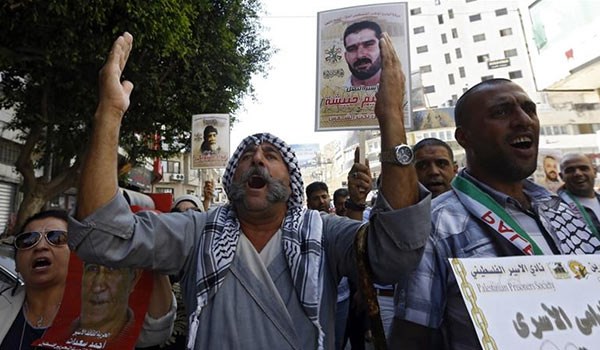
RNA - The Israeli officials have escalated punitive measures against the hunger strikers, Ma'an reported.
In a voice recording obtained by Ma’an, representatives of Fatah-affiliated prisoners in Israel’s Ramon prison declared their participation in the open hunger strike, which has seen the participation of hundreds of members of the Fatah movement, which had initially called the strike.
The Palestinian Committee of Prisoners' Affairs estimates 65 percent of all Palestinian prisoners jailed by Israel are affiliated to Fatah.
The prisoners urged all other Palestinians imprisoned in Israel to take part in the mass strike, which is already comprised of some 1,500 hunger strikers.
Meanwhile, the Handala Center for Prisoners and Former Prisoners said that the Israel Prison Service (IPS) transferred PFLP leader Kamil Abu Huneish from Israel’s Gilboa prison to solitary confinement in al-Jalama prison.
Munther Mifleh, another PFLP leader, was also transferred from Israel’s Hadarim prison to a solitary cell in Ramla prison, while Nader Sadaqa was transferred to solitary confinement in Beersheba prison from Gilboa prison.
The center added that these procedures used on hunger-striking Palestinian prisoners were “aimed at breaking the will of prisoners and preventing the strike from growing.”
The center also rejected all “collective punishment procedures” imposed on Palestinians by IPS and added that such policies “violate all international and human rights laws".
The Palestinian Committee of Prisoners’ Affairs reported on the first day of the strike that IPS officials had transferred Marwan Barghouthi the Fatah movement leader heading the strike, Karim Yunis, and Mahmoud Abu Srour from Hadarim prison to solitary confinement in Jalama prison.
The committee has also reported dozens of other cases in which Palestinians participating in the hunger strike have been transferred between solitary confinement cells in multiple Israeli prisons, including 70 hunger-striking prisoners in Hadarim, Nafha, Ramon, and Ashkelon being transferred to Nitzan prison.
Palestinian leaders of Fatah, PFLP, and the Democratic Front for the Liberation of Palestine (DFLP) have all been moved to solitary confinement since the start of the strike.
Imprisoned Palestinians have also reported that IPS officials have continued to deny them family visits, despite reports that a decision was made Wednesday by the Israeli Ministry of Justice that said it was illegal to ban prisoners from accessing their lawyers.
A joint statement released by the committee and the Palestinian Prisoner’s Society (PPS) said that IPS has continued to carry out search raids on sections of Israeli prisons where Palestinians have undergone the hunger strike.
In Nitzan and Ramla prisons, Israeli officials used police dogs on hunger-striking Palestinian detainees and seized the Quran from prisoners, according to the statement. IPS has also prevented Palestinians from praying and taking any breaks in the prison yards.
Meanwhile, demonstrations have been held across the occupied West Bank, including East Jerusalem, Israel, and among the diaspora in Syria on Friday to support the hunger strikers.
Initially called for by Fatah-affiliated prisoners, Palestinian prisoners from across the political spectrum have since pledged their commitment to undertake the strike, with the media committee of the “Freedom and Dignity” strike estimating on Tuesday that some 1,500 prisoners were forgoing food.
The hunger strikers have denounced the torture, ill treatment, and medical neglect of Palestinian prisoners at the hands of Israeli authorities, as well as Israel’s widespread use of administrative detention, internment without trial or charges, which is only permitted under international law in extremely limited circumstances.
Israeli authorities have detained approximately one million Palestinians since the establishment of the state of Israel in 1948 and the subsequent occupation of the West Bank, East Jerusalem, and the Gaza Strip in 1967, according to a joint statement released last week by Palestinian organizations.
According to prisoners' rights organization Addameer, some 6,300 Palestinians were held in Israeli custody as of March.
847/940